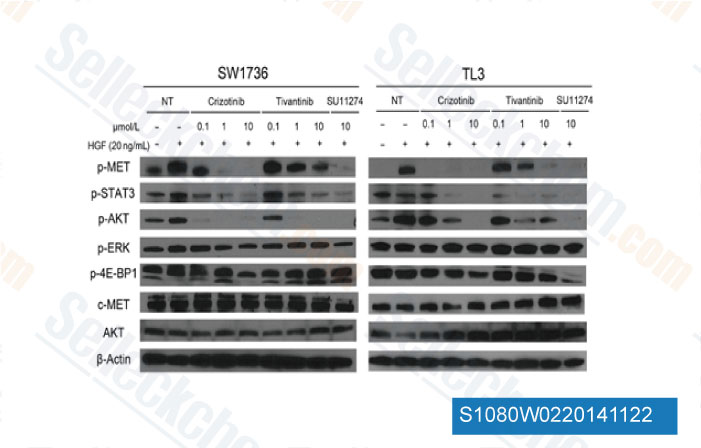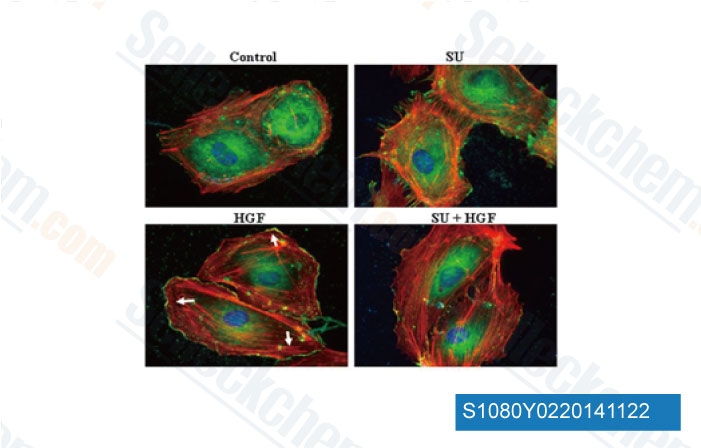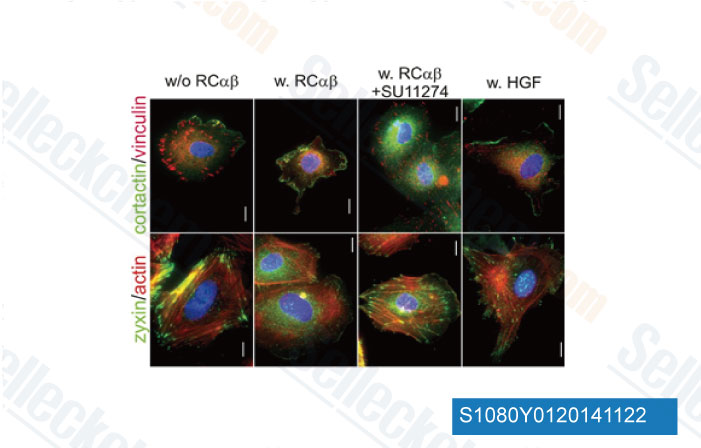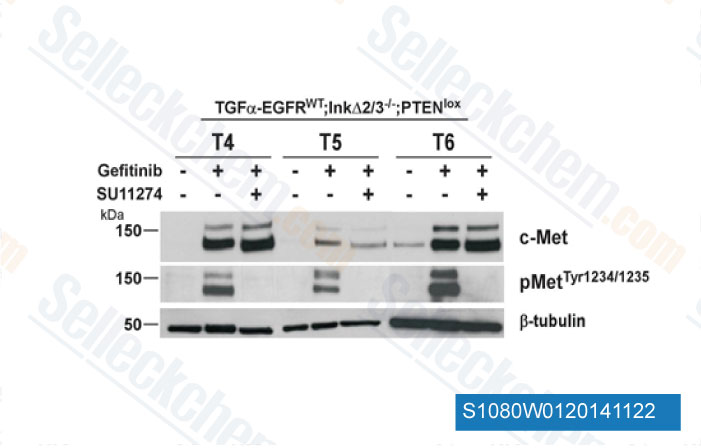|
Toll Free: (877) 796-6397 -- USA and Canada only -- |
Fax: +1-832-582-8590 Orders: +1-832-582-8158 |
Tech Support: +1-832-582-8158 Ext:3 Please provide your Order Number in the email. |
Technical Data
| Formula | C28H30CIN5O4S |
||||||||||
| Molecular Weight | 568.09 | CAS No. | 658084-23-2 | ||||||||
| Solubility (25°C)* | In vitro | DMSO | 92 mg/mL (161.94 mM) | ||||||||
| Ethanol | 2 mg/mL (3.52 mM) | ||||||||||
| Water | Insoluble | ||||||||||
| In vivo (Add solvents to the product individually and in order) |
|
||||||||||
|
* <1 mg/ml means slightly soluble or insoluble. * Please note that Selleck tests the solubility of all compounds in-house, and the actual solubility may differ slightly from published values. This is normal and is due to slight batch-to-batch variations. * Room temperature shipping (Stability testing shows this product can be shipped without any cooling measures.) |
|||||||||||
Preparing Stock Solutions
Biological Activity
| Description | SU11274 (PKI-SU11274) is a selective Met (c-Met) inhibitor with IC50 of 10 nM in cell-free assays, no effects on PGDFRβ, EGFR or Tie2. This compound induces autophagy, apoptosis and cell cycle arrest. | ||
|---|---|---|---|
| Targets |
|
||
| In vitro | SU11274 exhibits greater than 50-fold selectivity for Met versus Flk and more than 500 times selectivity versus other tyrosine kinases such as FGFR-1, c-src, PDGFbR, and EGFR. This compound inhibits the phosphorylation of key regulators of the PI3K pathway, including AKT, FKHR, or GSK3β. Treatment with this chemical inhibits the growth of TPR-MET-transformed BaF3 cells in a dose-dependent manner with IC50 of <3 μM in the absence of interleukin 3, without growth inhibition of BaF3 cells transformed by other oncogenic tyrosine kinases, including BCR-ABL, TEL-JAK2, TEL-ABL, and TEL-PDGFβR. In addition to cell growth, this compound treatment significantly inhibits the migration of BaF3. TPR-MET cells by 44.8% and 80% at 1 μM and 5 μM, respectively. It inhibits HGF-dependent phosphorylation of Met as well as HGF-dependent cell proliferation and motility with an IC50 of 1-1.5 μM. In H69 and H345 cells which have functional Met receptor, this inhibitor inhibits the HGF-induced cell growth with IC50 of 3.4 μM and 6.5 μM, respectively. It induces G1 cell cycle arrest with cells in G1 phase increased from 42.4% to 70.6% at 5 μM, and induces caspase-dependent apoptosis by 24% at 1 μM. [2] This compound inhibits cell viability in c-Met-expressing non-small cell lung cancer (NSCLC) cells with IC50 values of 0.8-4.4 μM, and abrogates hepatocyte growth factor-induced phosphorylation of c-Met and its downstream signaling. [3] |
Protocol (from reference)
| Kinase Assay:[1] |
|
|---|---|
| Cell Assay:[2] |
|
References
|
Customer Product Validation

-
Data from [ Mol Cancer Ther , 2014 , 13(1), 134-43 ]

-
Data from [ J Biol Chem , 2014 , 289(19), 13476-91 ]

-
Data from [ Arterioscler Thromb Vasc Biol , 2013 , 33(3), 544-54 ]

-
Data from [ Oncogene , 2012 , 31(25), 3039-50 ]
Selleck's SU11274 Has Been Cited by 69 Publications
| Inhibition of TFF3 synergizes with c-MET inhibitors to decrease the CSC-like phenotype and metastatic burden in ER+HER2+ mammary carcinoma [ Cell Death Dis, 2025, 16(1):76] | PubMed: 39920140 |
| Establishment and characterization of a new human gallbladder cancer cell line, OCUG-2 [ World J Exp Med, 2025, 15(2):100443] | PubMed: 40546672 |
| The anti-tumor effects of AZD4547 on ovarian cancer cells: differential responses based on c-Met and FGF19/FGFR4 expression [ Cancer Cell Int, 2024, 24(1):43] | PubMed: 38273381 |
| Establishing a new human lung squamous cell carcinoma cell line, OMUL-1, expressing insulin-like growth factor 1 receptor and programmed cell death ligand 1 [ Thorac Cancer, 2024, 10.1111/1759-7714.15488] | PubMed: 39552203 |
| Epithelial cell adhesion molecule (EpCAM) regulates HGFR signaling to promote colon cancer progression and metastasis [ J Transl Med, 2023, 21(1):530] | PubMed: 37543570 |
| Epithelial cell adhesion molecule (EpCAM) regulates HGFR signaling to promote colon cancer progression and metastasis [ J Transl Med, 2023, 21(1):530] | PubMed: 37543570 |
| Met-signaling Controls Dendritic Cell Migration in Skin by Regulating Podosome Formation and Function [ J Invest Dermatol, 2023, S0022-202X(23)00100-8] | PubMed: 36813160 |
| Integrative analysis of drug response and clinical outcome in acute myeloid leukemia [ Cancer Cell, 2022, S1535-6108(22)00312-9] | PubMed: 35868306 |
| Resistance to tyrosine kinase inhibitors promotes renal cancer progression through MCPIP1 tumor-suppressor downregulation and c-Met activation [ Cell Death Dis, 2022, 13(9):814] | PubMed: 36138026 |
| β2-adrenergic receptor promotes liver regeneration partially through crosstalk with c-met [ Cell Death Dis, 2022, 13(6):571] | PubMed: 35760785 |
RETURN POLICY
Selleck Chemical’s Unconditional Return Policy ensures a smooth online shopping experience for our customers. If you are in any way unsatisfied with your purchase, you may return any item(s) within 7 days of receiving it. In the event of product quality issues, either protocol related or product related problems, you may return any item(s) within 365 days from the original purchase date. Please follow the instructions below when returning products.
SHIPPING AND STORAGE
Selleck products are transported at room temperature. If you receive the product at room temperature, please rest assured, the Selleck Quality Inspection Department has conducted experiments to verify that the normal temperature placement of one month will not affect the biological activity of powder products. After collecting, please store the product according to the requirements described in the datasheet. Most Selleck products are stable under the recommended conditions.
NOT FOR HUMAN, VETERINARY DIAGNOSTIC OR THERAPEUTIC USE.
